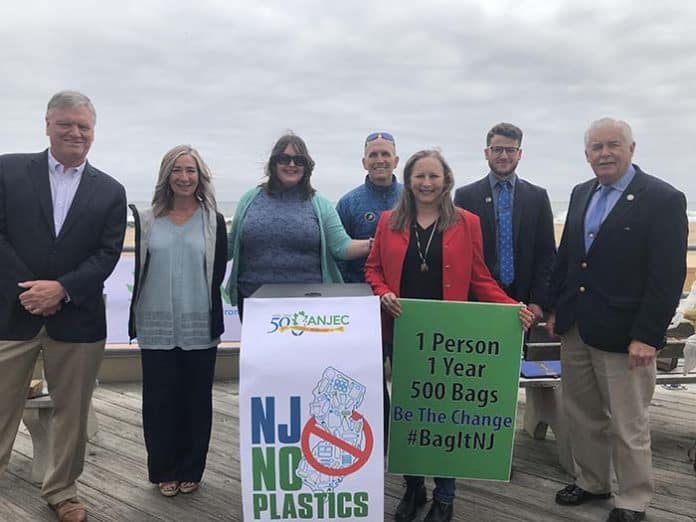
NEW JERSEY – Statewide organizations are commending municipalities that have pledged to ban single-use plastic waste in order to combat plastic pollution.
The American Littoral Society and The Association of NJ Environmental Commissions (ANJEC) came together on May 8 with state and municipal leaders from across New Jersey to celebrate these local townships that have taken a stand on this issue.
“The American Littoral Society is especially grateful to the more than 20 municipalities that have adopted ordinances banning the intentional release of balloons,” said Helen Henderson, Ocean Program Manager for the Littoral Society. “Soft plastics, like balloons, are the type of pollution most likely to cause death in birds and turtles who ingest them, and animals can also become entangled in the attached balloon ribbons.”
There are numerous types of plastics that prove dangerous to marine life, including balloons. Balloons are especially dangerous because animals like sea turtles or birds often mistake them for food and or can get entangled in the attached ribbons. Balloons are high on the list of items collected at beach cleanups.
According to the American Littoral Society, awareness of plastic pollution is growing in NJ and beyond. Even places like Long Island, NY have prohibited balloon releases and coastal towns in Delaware are preparing similar ordinances.
Numerous states have already have made releases illegal, States such as California, Connecticut, Florida, Tennessee and Virginia and others have already made balloon releases illegal. New Jersey is one of many states – including Arizona, Maine, Massachusetts, New Hampshire, New York and Rhode Island – that is considering the ban as well.
According to the Society, approximately 82 percent of the trash picked up during Clean Ocean Action’s beach cleanups in 2018 was plastic and Styrofoam waste.
Preventing plastic pollution is essential for the health of coastal communities, such as the Jersey Shore. Local towns have already begun taking steps including:
- Asbury Park, NJ has introduced a ban on intentional balloon releases and plans to introduce a plastic bag ban and fee structure ordinance
- The Borough of Bradley Beach has passed ordinances banning both plastic bags and mass balloon releases.
- Ocean Gate, NJ passed an ordinance regulating plastic bags, food containers and straws that will go into effect in September.
“We are so proud of the work local communities are doing to cut back on the amount of plastic waste that eventually ends up polluting our streams and rivers,” said ANJEC Executive Director Jennifer Coffey. “As part of our mission to support local environmental action throughout the state, ANJEC has been working for the past four years with municipal environmental commissions and other organizations to educate communities and state officials on the importance of plastics legislation and the dire need to reduce plastic consumption.”
Long Beach Township is a great example of the successful plastic bag ban, which was enacted there in November 2017.
“The bag ban has been a success,” said Long Beach Mayor Joseph Mancini. ”The business owners came on board quickly and public engagement was successful through our reusable bag giveaway program. We made it through the first tourism season strong.”
Many shore communities, like Point Pleasant Beach, have banned mass balloon releases, not only because of the litter they cause but the harm they cause to marine life.
“As a popular seaside community with a good number of ocean-side weddings, parties and celebrations, balloon releases of all sizes and shapes were occurring regularly in Point Pleasant
Beach,” said Point Pleasant Beach Councilman Paul Kanitra. “At beach cleanup after beach cleanup, we were continually finding the deflated remnants on our beaches and in our waters.
Our balloon release ban and the accompanying penalties have significantly curbed this practice in town and we’re seeing the effects already in the short time since its enactment.”
According to the US Environmental Protection Agency (EPA), of all trash, plastic waste has the greatest potential to harm the environment, wildlife and humans. It can be found in almost all water bodies and is transported by rivers to the ocean. There it moves with the currents, and is often eaten by birds and fish, concentrating toxic chemicals in their tissues, and filling their stomachs, causing them to starve.
“NJEL urges municipalities: Don’t wait for the State! The State is waiting for you,” said Noemi de la Puente of NJ Environmental Lobby. “The faster townships deal with disposable plastic, the better off they will be in the future as landfill space in the northeast diminishes, and the cleaner the township will be because litter will diminish. We can’t recycle our way out of this disposable plastic problem. We generate bags by the billions. Recycling will never, ever catch up with our plastic waste, especially with China closing its doors to American recycling streams. We owe it to our children and grandchildren — don’t leave them stuck with our tons and tons of plastic waste.”
“New Jersey can and must soon adopt legislation banning the needless and harmful practice of balloon releases and also take up the issue of single use plastic bags once again” added Henderson. “Until that time, we will continue to encourage and celebrate our local champions who are making a difference now” she concluded.







